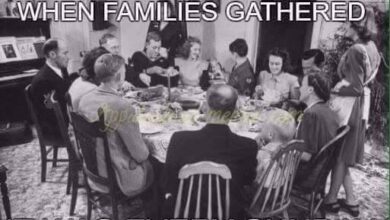“Those Were the Days”: Music and Memory in American Sitcom History
The opening and closing themes for All in the Family (1971-1979), particularly “Those Were the Days,” hold a significant place in American television history. Sung by Carroll O’Connor, who portrayed the iconic Archie Bunker, and Jean Stapleton, who played Edith Bunker, the song encapsulates Archie’s nostalgic yearning for the simpler times of his youth. Its vaudeville-inspired melody and politically charged lyrics reflect the show’s adept balance between humor and social commentary. The tune opens with a reference to Glenn Miller, a prominent big band leader from the 1940s, immediately evoking a time of supposed stability and traditional values that Archie longs to revisit.
The lyrics delve into themes such as gender roles, economic shifts, and political leadership, subtly revealing Archie’s desire to return to a pre-welfare state America. The line, “Mister, we could use a man like Herbert Hoover again,” references Hoover, the president during the onset of the Great Depression, symbolizing a yearning for perceived self-sufficiency and traditional American values. This reference not only underscores Archie’s conservative mindset but also sets the stage for the cultural tensions between tradition and progress that were central to All in the Family. The song effectively sets the tone for the debates and discussions that unfold throughout the series, highlighting the generational divides and societal changes of the 1970s.
Carroll O’Connor’s performance of “Those Were the Days” is notably playful and slightly off-key, which serves to emphasize the charm and authenticity of the working-class Bunker household. His imperfect singing adds a layer of humanity to his character, making Archie Bunker more relatable despite his often stubborn and bigoted viewpoints. Jean Stapleton’s harmonizing with O’Connor further enhances this authenticity, portraying Edith Bunker as the compassionate and gentle counterbalance to Archie’s gruff exterior. Their joint performance of the theme song reflects the dynamic between their characters, highlighting both the conflicts and the underlying familial bonds that drive the show’s narrative.
The closing theme, “Remembering You,” composed by Roger Kellaway, offers a contrasting yet complementary musical experience. As an instrumental piece, it provides a subtle and reflective end to each episode, contrasting the lively debates and conflicts that characterize the show’s content. While not as widely recognized as the opening theme, “Remembering You” contributes to the overall nostalgic tone of the series, reinforcing the sense of longing for the past that Archie embodies. This instrumental piece serves as a quiet counterpart to the vocal opening, encapsulating the emotional journey of the characters as they navigate the complexities of modern life.
Jean Stapleton, who performed alongside Carroll O’Connor, brought depth and warmth to the theme song with her harmonious vocals. Her portrayal of Edith Bunker was pivotal in balancing the often contentious dynamics within the Bunker household. Stapleton’s ability to convey empathy and strength through her character and her contributions to the theme song underscored the show’s emphasis on family unity amidst social upheaval. Her performance added a layer of sincerity and genuineness that resonated with audiences, making the theme song not only memorable but also deeply connected to the show’s themes.
The songwriting team behind “Those Were the Days” crafted lyrics that were both nostalgic and critical, reflecting the dual nature of the show itself. The song’s playful references, such as “Gee, our old LaSalle ran great,” which alludes to a luxury car brand from the early 20th century, highlight Archie’s attachment to symbols of a bygone era. These references serve as cultural touchstones that evoke a sense of history and continuity, while also critiquing the notion of returning to a past that may not have been as idyllic as it is remembered. This nuanced approach allowed the show to engage viewers in meaningful conversations about progress and preservation.
Roger Kellaway, the composer of the closing theme “Remembering You,” was an accomplished pianist and composer known for his work in jazz and film scores. His composition for All in the Family provided a sophisticated musical backdrop that complemented the show’s themes without overshadowing the narrative. Kellaway’s ability to create a melodic and emotionally resonant piece helped to underscore the reflective moments of the show, allowing viewers to contemplate the episodes’ events and the characters’ development as the credits rolled. His contribution, though less prominent than the opening theme, played a crucial role in maintaining the show’s emotional balance.
All in the Family itself was a groundbreaking series that tackled a wide array of social issues, including racism, sexism, and political corruption, through the lens of a working-class family. The Bunkers’ interactions often highlighted the generational and ideological divides that were prevalent in American society during the 1970s. The theme song, with its blend of humor and critique, perfectly mirrored the show’s approach to addressing these complex topics. By intertwining entertainment with social commentary, All in the Family set a precedent for future sitcoms, demonstrating that television could be both engaging and thought-provoking.
The success of All in the Family was reflected in its impressive Nielsen ratings, where it dominated the top spot from 1971 to 1976. The show’s ability to resonate with a broad audience can be attributed in part to its relatable characters and the universal themes explored through its narrative and musical elements. The theme song became an integral part of the viewing experience, instantly recognizable and deeply associated with the show’s identity. Its enduring popularity is a testament to its effectiveness in capturing the essence of the series and the era it depicted.
The cultural impact of “Those Were the Days” extended beyond the show itself, influencing how theme songs were perceived in the context of television programming. The song’s integration of humor, nostalgia, and social critique demonstrated that a theme could do more than merely introduce a show; it could encapsulate its core themes and set the emotional tone for the audience. This approach has been emulated by numerous other series, underscoring the lasting legacy of All in the Family‘s musical choices.
Even decades after the show concluded, All in the Family and its theme songs remain significant in discussions about television history and the evolution of sitcoms. The themes of nostalgia and resistance to change continue to resonate in contemporary society, making the show’s messages still relevant today. The theme songs, particularly “Those Were the Days,” are often cited as exemplars of how music can enhance storytelling and deepen the connection between a show and its audience. The enduring popularity of these themes underscores the timeless nature of the show’s exploration of American life and its challenges.
For more about the show’s themes and impact, additional resources such as Wikipedia and various media commentaries provide extensive analyses and retrospectives. These sources delve into the nuances of the show’s characters, its groundbreaking approach to sensitive topics, and its lasting influence on television and popular culture. By examining the interplay between the show’s narrative and its musical elements, one gains a comprehensive understanding of why All in the Family remains a seminal work in the landscape of American television.





